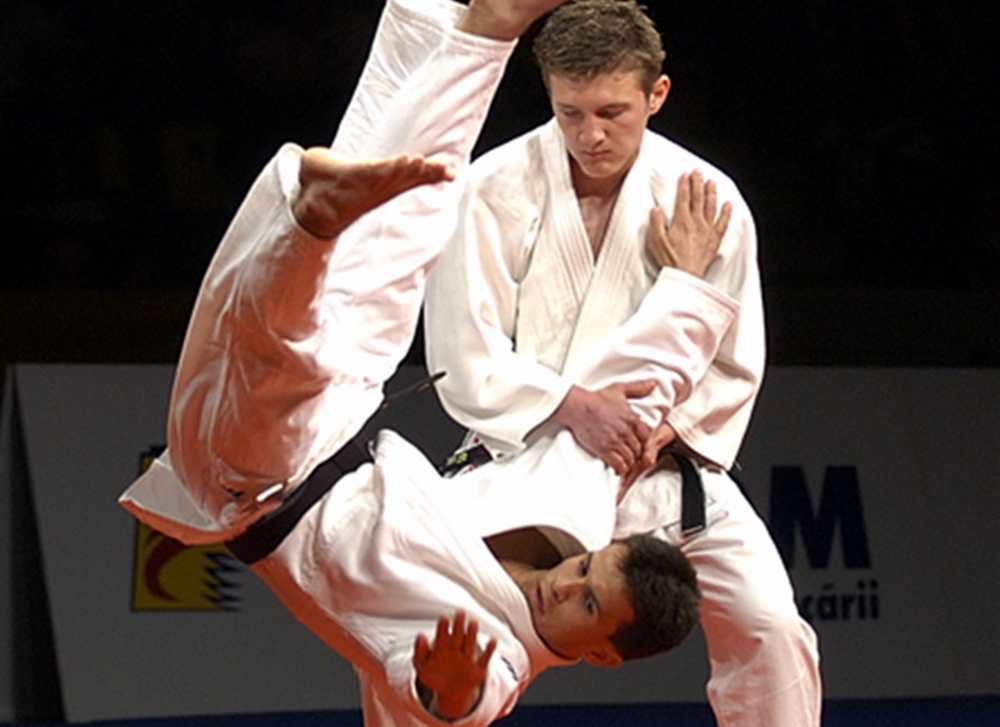I reached my fitness high water mark at the age of twenty-four. I ran thirty miles a week, sweated three hundred pushups a day, and I brawled each week in the local boxing club.

In the midst of my peak physical prowess (never mind its short duration), I met a man with a black belt in Judo. He was forty-ish, chubby, and he wheezed as he walked. I think his exercise routine consisted of lifting large bottles of beer rather than heavy barbells.
He was the first black belt of any kind I had ever met. He intrigued me. Could this chubby, middle-aged man really beat me in a friendly fight? The fool inside me challenged him to hand-to-hand combat.
Not since infancy have I spend so much time on the ground. The lawn and I became intimate allies. I huffed, puffed, wheezed, and groaned (and maybe cursed, but it’s still all a blur) as he repeatedly—and effortlessly—tossed me to the ground.
It didn’t matter what punch I threw. Each jab, hook, and uppercut finished with me staring at the sky, gasping for air, and wondering what had happened.
How Do They Do That?
After my embarrassing attempt to box a black belt, my pudgy pal explained the mechanics. He said that the secret is to get your enemy’s strength to turn traitor against him, to redirect his force so that it is working for you.
Whenever I tried to punch, my friend slipped aside and pulled. My own momentum—aided by his tiny tug—threw me off balance. My own strength became my biggest enemy. The stronger I attacked, the harder I fell.
God works the same mysterious way in our lives.
He doesn’t create the evil in this world, but he redirects it so that it battles its own architect. As Joseph said to his brothers, “You meant it for evil, but God meant it for good.”
It’s called spiritual judo.
The Runt
Look at the life of David. Samuel comes to David’s father to anoint a king, but David isn’t invited to the party. The prophet asks David’s father if anyone is missing, and David’s father responds, “Everyone is here but ‘the youngest’” (1 Sam. 16:11).
But the Hebrew word translated “the youngest” (hakaton) has layers of meaning. It’s hard to translate because it combines the picture of youthfulness with a sense of insignificance. To merely translate it as “the youngest” isn’t disparaging enough.
A better translation is to say, “Everyone is here but ‘the runt.’”
David was considered so insignificant by his family that he was left in the fields. There he practiced the slingshot to perfection. If the runt David had been treated with respect—if he had trained with King Saul’s army like his brothers—David would have cowered before Goliath like the rest of them.
Instead, God turned the wounding insult—“the runt”—on its head. He used the wound to create a hero. He hired the enemy’s force to fight against the enemy.
Where Is Our Hope?
David became King of Israel through spiritual Judo; and your life and my life depend on this spiritual truth:
God is unsatisfied with merely neutralizing evil; God employs even evil to effect its own destruction.
God is the ultimate Black Belt. Our hope for the suffering of our lives is our Father’s spiritual redirection, our Father’s spiritual Judo.
Psalm 57 describes it this way: “They set a net for my steps; my soul was bowed down. They dug a pit in my way, but they have fallen into it themselves.”
Sam
Used with permission of: http://beliefsoftheheart.com/


 The Nonsense of S.M.A.R.T. Sense
The Nonsense of S.M.A.R.T. Sense
Very thought provoking- definitely a re- read for me! It also occurs to me that when I fight in my own strength against my enemies, I’ll end out “eating grass” every time. The harder I try (planning, punching, willpower, self salvation) the easier I fall. Either analogy the point is towards GOD! Thanks for post!
Hi Beth,
Terrific counter-application: “The harder I try the easier I fall.” Thanks for that thought.
We’re weird, aren’t we? We know this lesson but we don’t know it; we remember and then we forget.
Thanks,
Sam